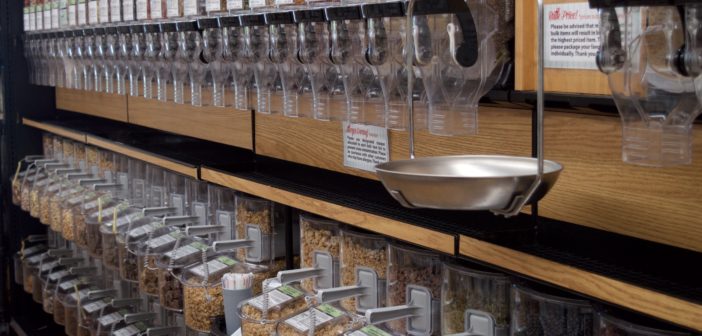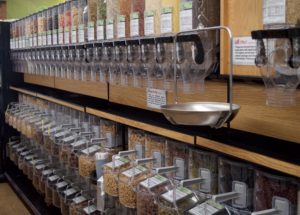Many people who hear the word “bulk” immediately think of a big warehouse, but it can also refer to an often overlooked, but valuable section of your local market: the bulk section.
Buying healthy, organic foods from the bulk section can be a great option for your family – especially if you follow a strict budget. Here’s why:
Buy only what you want or need
Shopping the bulk section allows you to buy the amount you want by weight, rather than be limited to packages of foods that may contain too little or too much for your needs. This makes it a great place to start if you want to try new things–you won’t get stuck with a bunch of something your family won’t ever eat again. It’s also a great way to stock up on items you use frequently.
Save money
According to research results from Portland State University’s Food Industry Leadership Center, you can save as much as 89% by buying organic bulk foods as opposed to their packaged counterparts. Bulk goods don’t come in extra packaging, which makes up about 8% of the cost of most food. Plus, when you only buy what you need, you reduce food waste, which also puts dollars back into your family’s food budget.
Help the environment
Researchers at Portland State found that if all Americans switched to bulk purchases for common items, it would save tens of millions of pounds of trash from entering landfills each year. And according to bulkisgreen.org, bulk foods require less overall transportation to deliver to consumers. Since they don’t require packaging components, those components don’t need to be produced and transported prior to being filled. Plus, the transportation of bulk product to retailers is more efficient because it can be packed more densely on a truck.
What else should I know about buying in bulk?
Save time at check-out by writing the item’s PLU number on the twist tie.
Bulk food bins typically have a PLU (Price Look-Up code) number somewhere on the label. By writing this number visibly on the bag, label, or twist-tie, you’ll make it easier for the cashier to identify and key in the item–thus saving you time at check-out.
For your own reference, it also helps to include the item’s name. Things can get confusing once you get home if your items aren’t labeled—especially if you have multiple items that look very similar.
Once home, transfer your foods to easy-to-access containers for storage.
One great cost-efficient way to organize and visualize your bulk items at home is to save and re-use containers, like glass pasta sauce jars. Label and date the containers so, at a glance, you’ll know exactly what’s in the jar and how long it’s been in your pantry.
Know the best way to store bulk foods for maximum quality and freshness.
If you keep your foods on open pantry shelves that get lots of exposure to light, opt for a container that’s more opaque. Light can damage the flavor and nutrient value of nuts and seeds, and most seeds (such as pumpkin, sunflower, and flax) and nuts (walnuts and pine nuts in particular) keep longer in the refrigerator or freezer. Brown rice will be good for about six months at room temperature, and white rice lasts for a few months longer.
Ready to jump on the bulk bandwagon? You can find organic bulk bins in all Dean’s Natural Food Market locations, but the largest selection is currently in their Ocean location. They offer a wide variety of organic items, including dried beans, whole grains, oats, raw nuts and seeds, dried fruit, fresh-ground nut butters, coffee, candy, snacks, and much more!
Have additional tips for buying bulk? Share them in the comments below.












